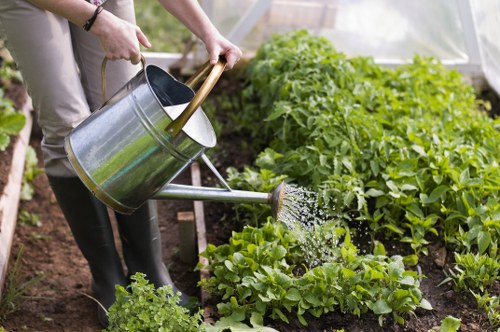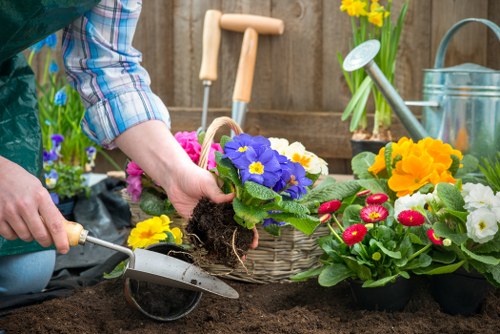Comprehensive Guide to Garden Maintenance in Brockley

Maintaining a beautiful garden in Brockley requires consistent care and attention to detail. Whether you’re a seasoned gardener or a beginner, understanding the specific needs of your garden can help it thrive throughout the year.
Garden maintenance involves a variety of tasks, including planting, pruning, weeding, and pest control. Each of these activities plays a vital role in ensuring your garden remains healthy and aesthetically pleasing.
In Brockley, the climate and soil conditions are unique, which means that garden maintenance practices should be tailored to suit these factors. This article will guide you through the essential aspects of garden maintenance in Brockley, providing you with the knowledge needed to create and sustain a vibrant outdoor space.

Planning Your Garden Maintenance Schedule
Effective garden maintenance starts with a well-thought-out schedule. Planning your tasks in advance ensures that you stay on top of necessary activities and that your garden receives the care it needs throughout the year.
Seasonal Tasks:
- Spring: Prepare the soil, plant new flowers and vegetables, and prune trees and shrubs.
- Summer: Regular watering, weeding, and pest control are essential during the warmer months.
- Autumn: Clean up fallen leaves, plant bulbs for next spring, and prepare plants for the winter.
- Winter: Protect sensitive plants, prune dormant trees, and plan for the upcoming gardening season.
By aligning your maintenance tasks with the seasons, you can ensure that your garden remains healthy and vibrant all year round.

Essential Tools for Garden Maintenance
Having the right tools is crucial for effective garden maintenance. Investing in quality equipment can make your gardening tasks easier and more efficient.
Basic Gardening Tools
- Pruners: For trimming and shaping plants.
- Shovel: Essential for digging and planting.
- Rake: Useful for clearing leaves and debris.
- Hoe: Ideal for weeding and soil cultivation.
- Watering Can: Necessary for providing adequate moisture to your plants.
Advanced Gardening Equipment
For more extensive garden maintenance, consider investing in advanced tools such as lawn mowers, hedge trimmers, and irrigation systems. These tools can help you maintain larger gardens with ease.

Soil Health and Fertilization
Healthy soil is the foundation of a thriving garden. Proper soil maintenance involves understanding your soil type and ensuring it has the necessary nutrients for plant growth.
Soil Testing
Conducting a soil test helps determine the pH level and nutrient content of your soil. This information is crucial for selecting the right plants and fertilizers.
Fertilization
Based on the soil test results, choose appropriate fertilizers to enrich your soil. Organic fertilizers are a popular choice as they improve soil structure and promote beneficial microbial activity.
Composting
Creating a compost heap is an excellent way to recycle garden waste and produce nutrient-rich compost for your plants. Composting not only reduces waste but also enhances soil fertility.

Pest and Weed Control
Managing pests and weeds is crucial for maintaining a healthy garden. Uncontrolled pests and weeds can damage plants and reduce crop yields.
Identifying Common Pests
Keeps your garden safe by regularly inspecting plants for signs of pests. Common garden pests in Brockley include aphids, slugs, and beetles.
Natural Pest Control Methods
Opt for eco-friendly pest control solutions such as introducing beneficial insects, using neem oil, or applying insecticidal soaps. These methods minimize harm to the environment and non-target organisms.
Weed Management
Regular weeding is essential to prevent weeds from competing with your plants for nutrients and water. Mulching can also help suppress weed growth and retain soil moisture.

Pruning and Trimming
Pruning and trimming are vital for maintaining the shape and health of your plants. Proper pruning encourages growth and removes dead or diseased branches.
Pruning Techniques
Different plants require different pruning techniques. Familiarize yourself with the specific needs of each plant in your garden to ensure effective pruning.
Timing Your Pruning
The best time to prune most plants is during the dormant season. However, some flowering plants may benefit from pruning after they bloom.
Tools for Pruning
Use sharp and clean pruning tools to make precise cuts and prevent the spread of diseases. Regularly sterilize your tools to maintain their effectiveness.

Watering Strategies
Proper watering is essential for the health of your garden. Both overwatering and underwatering can have detrimental effects on your plants.
Understanding Plant Needs
Different plants have varying water requirements. Research the specific needs of each plant to provide the appropriate amount of moisture.
Efficient Watering Techniques
Adopt watering techniques that conserve water and ensure deep soil penetration. Drip irrigation systems and soaker hoses are effective methods for delivering water directly to the root zone.
Rainwater Harvesting
Collecting rainwater is an eco-friendly way to water your garden. Install rain barrels to capture and store rainwater for later use.

Mulching for Garden Health
Mulching is a beneficial practice that involves covering the soil with organic or inorganic materials. It helps retain moisture, suppress weeds, and regulate soil temperature.
Types of Mulch
- Organic Mulch: Includes materials like wood chips, straw, and compost.
- Inorganic Mulch: Comprises gravel, plastic sheeting, and landscape fabric.
Applying Mulch
Apply mulch in a thick layer around your plants, ensuring it does not touch the plant stems. This prevents moisture loss and protects the plants from extreme temperatures.
Benefits of Mulching
Mulching not only enhances the appearance of your garden but also improves soil health by adding organic matter as it decomposes.

Plant Selection and Arrangement
Selecting the right plants and arranging them thoughtfully can significantly impact the beauty and functionality of your garden.
Choosing Plants for Brockley
Consider the local climate, soil type, and sunlight availability when selecting plants. Native plants are often well-suited to local conditions and require less maintenance.
Designing Your Garden Layout
Create a balanced garden layout by grouping plants with similar water and light needs together. This makes maintenance easier and promotes healthy plant growth.
Companion Planting
Companion planting involves growing certain plants together to enhance growth and deter pests. For example, planting marigolds with vegetables can help repel harmful insects.

Lawn Care and Maintenance
A well-maintained lawn adds to the overall appeal of your garden. Proper lawn care involves mowing, fertilizing, aerating, and controlling pests.
Mowing Tips
Mow your lawn regularly, ensuring that you do not cut more than one-third of the grass height at a time. This promotes healthy growth and prevents stress on the grass.
Fertilization and Aeration
Fertilize your lawn periodically to provide essential nutrients. Aerating the soil helps improve water and nutrient absorption, promoting a lush and green lawn.
Pest Control
Monitor your lawn for signs of pests and take appropriate measures to control infestations. Integrated pest management practices can help maintain a healthy lawn without the use of harmful chemicals.

Seasonal Garden Maintenance Tips
Adapting your garden maintenance practices to the changing seasons ensures that your garden remains vibrant and healthy throughout the year.
Spring Maintenance
Spring is the perfect time to rejuvenate your garden. Start by clearing out any debris from the winter months and preparing the soil for new plantings.
Summer Maintenance
During the summer, focus on regular watering, weeding, and pest control. Ensure that your plants receive adequate moisture to withstand the heat.
Autumn Maintenance
As the weather cools, clean up fallen leaves and plant bulbs for spring. Protect sensitive plants from the first frost by providing appropriate coverings.

Eco-Friendly Garden Practices
Embracing eco-friendly gardening practices not only benefits the environment but also promotes a healthier garden.
Composting
Composting reduces waste and provides a natural fertilizer for your plants. It enriches the soil, enhancing its structure and fertility.
Water Conservation
Implement water-saving techniques such as mulching, rainwater harvesting, and using drought-resistant plants to minimize water usage.
Sustainable Pest Management
Use natural pest control methods like introducing beneficial insects, using organic pesticides, and practicing crop rotation to manage pests sustainably.

Professional Garden Maintenance Services in Brockley
If maintaining your garden feels overwhelming, consider hiring professional garden maintenance services in Brockley. Experts can provide tailored solutions to meet your garden’s specific needs.
Benefits of Professional Services
- Expertise: Professionals have the knowledge and experience to handle various gardening tasks efficiently.
- Time-Saving: Hiring experts allows you to enjoy your garden without the hassle of maintenance.
- Customized Care: Services are tailored to address the unique requirements of your garden.
Choosing the Right Service Provider
When selecting a garden maintenance service, consider their experience, range of services, and customer reviews. Ensure they understand your vision for your garden and can deliver quality results.
Cost Considerations
Evaluate the cost of professional services against the benefits they offer. Investing in quality maintenance can enhance the longevity and beauty of your garden.

DIY Garden Maintenance Tips
For those who prefer a hands-on approach, DIY garden maintenance can be both rewarding and cost-effective. Here are some tips to help you maintain your garden on your own.
Regular Inspection
Inspect your garden regularly for signs of pests, diseases, and nutrient deficiencies. Early detection allows for prompt action, preventing minor issues from becoming major problems.
Efficient Scheduling
Create a maintenance schedule that outlines daily, weekly, and monthly tasks. Consistency is key to keeping your garden in top condition.
Continuous Learning
Stay informed about gardening techniques and trends. Attend workshops, read gardening books, and engage with local gardening communities to enhance your skills.

Conclusion
Effective garden maintenance in Brockley involves a combination of planning, the right tools, proper techniques, and timely care. By following the tips outlined in this article, you can create and sustain a beautiful and healthy garden that enhances your outdoor living space.
Whether you choose to maintain your garden yourself or hire professional services, consistent effort and attention to detail will ensure your garden thrives all year round.
Contact us today to learn more about our garden maintenance services in Brockley and let us help you achieve the garden of your dreams.
